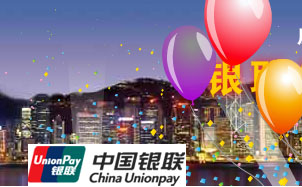
CHINA UnionPay Co is carving its way into Hong Kong on the back of rising consumption from Chinese mainland tourists visiting the renowned shopping haven.
"I prefer China UnionPay as a bank card operating system" can be frequently heard from mainland visitors when they go shopping in Hong Kong.
The choice of the UnionPay system, in which investors pay the bill with yuan-denominated cards, can help save costs on currency exchanges.
Visa and MasterCard, for example, require a 1.5 percent fee for changing non-greenback overseas currency into United States dollar in overseas purchasing.
"Hong Kong is the first step in our overseas expansion, and network construction is being continually updated to make it smooth for mainland visitors' consumption payments in Hong Kong," the Shanghai-based company said.
In January 2004, UnionPay, the sole bank card transaction system operator in the mainland, forayed into Hong Kong and enabled yuan-backed bank cards to offer POS consumption, automatic teller machine inquiries and cash-out services. UnionPay's business goes well in the special administrative region amid the two sides' economic links.
UnionPay-based card transactions more than tripled to HK$12 billion (US$1.53 billion) in the three years since the company started business from scratch in Hong Kong.
By the end of last year, 21,605 merchants and 2,430 ATMs in Hong Kong accepted UnionPay cards. That equates to a strike rate of 90 percent of ATMs and more than 70 percent of merchants in Hong Kong for UnionPay.
The figures also translate into a growing income base for the government-backed UnionPay.
"When my mom visited Hong Kong nine years ago, she had to transfer yuan into Hong Kong dollars in Shanghai and carried the cash during the trip," said Qiu Shanshan, a 26-year old white-collar worker in Shanghai.
"When I visited Hong Kong in 2006 I had to use up all the Hong Kong dollars she once exchanged before using my UnionPay card."
More than 65 percent of consumption by mainland visitors to Hong Kong is for shopping and the figure is as high as 85.5 percent for mainland visitors who don't stay overnight in the region.
Close to 20 Hong Kong banks have joined UnionPay and its members, including HSBC, Hang Seng, DBS Bank (Hong Kong) and Bank of China (Hong Kong), have already started issuing UnionPay debit cards.
It is the first time yuan-backed bank cards have been issued outside the mainland by non-mainland banks. The cards throw open the door for 320,000 POS machines and 54,000 ATMs in the mainland for HK card holders.
The yuan is also seeing increased use in Hong Kong.
In 2003, Hong Kong authorities allowed yuan deposits, exchange, remittance and bank cards in the SAR.
In 2005, the SAR authority announced a lift in the maximum daily cash exchange for individuals from 6,000 yuan (US$787) to 20,000 yuan. The upper limit on yuan remittance increased from 50,000 yuan to 80,000 yuan. The authority in 2005 also announced the cancellation of the limit on a maximum credit line of 100,000 yuan on HK-issued yuan bank cards.